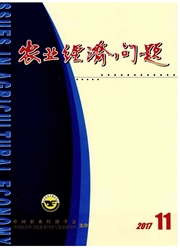

 中文摘要:
中文摘要:
作为在处理水缺乏的问题的高优先级,水定价政策的效果仍然是一个争论问题,特别环境效果。用在北中国的三个灌溉区域(标志) 的家庭级的面板数据,这篇论文探查在本地环境上升起的水价格的潜在的影响。考试证明农民们将作为对升起的溢水价格的回答减少米饭区域。变化种植制度将施加三方面的环境影响,包括源于渗出物的减小和灌溉的水并且在地下水,从化肥和杀虫剂申请的非点污染的否定效果,和地灌溉设备的损失的利用上的过滤的落下的地下水水平。水定价不是显著地为地面水由于地下水的替换减少农业用水消费的一个有效工具,它将导致否定环境效果。让中国管理在标志改进管理效率是一项必要任务。
 英文摘要:
英文摘要:
As a high priority in dealing with the problem of water scarcity, the effect of water pricing policy remains a controversial issue, especially the environmental effect. Using household-level panel data of three irrigation districts (IDs) in the northern China, this paper probes the potential impact of water price rising on local environment. The examination shows that farmers will reduce the rice area as a response to the rising surface water prices. The changing cropping pattern will exert three-fold environmental impacts, including the dropping groundwater level resulting from the reduction of seepage and percolation of irrigated water and overexploitation of groundwater, the negative effect of non-point pollution from fertilizer and pesticide application, and the loss of field irrigation facilities. Water pricing is not a valid means of significantly reducing agricultural water consumption due to the substitution of groundwater for surface water, it will lead to negative environmental effect. It is an imperative task for Chinese government to improve the management efficiency at IDs.
 同期刊论文项目
同期刊论文项目
 同项目期刊论文
同项目期刊论文
 期刊信息
期刊信息
